The Apple iOS 9 Review
by Brandon Chester on September 16, 2015 8:00 AM EST- Posted in
- Smartphones
- Apple
- Mobile
- Tablets
- iOS 9
Siri
Siri debuted with iOS 5 on the iPhone 4s, and at the time was really the first virtual assistant integrated into the core of a mobile OS. It has faced steady competition from Google Now and now from Microsoft's Cortana, and in my experience it seems that Google Now still holds an advantage as far as speed and accuracy goes. However, at WWDC 2015 Apple detailed a number of statistics relating to Siri, and showed how Siri is being improved in iOS 9. According to Apple, Siri serves over one billion requests every week, and has gotten 40% more accurate in the past year, with a word error rate of just 5%. Siri has also gotten 40% faster in the last year, and having tried using Siri again for the purposes of this review it does seem that it has improved in these respects.
iOS 9 focuses on making Siri more intelligent and proactive. Part of this just involves simple improvements, such as how conversions are now done natively instead of referencing Wolfram Alpha, which ends up being much faster. In other cases, the fact that Siri is more aware of context allows for new uses that weren't previously possible. You can see above how asking Siri to remind me to read an article created a reminder which would have an embedded link to the webpage I was reading when it reminds me after I arrive home. You can also use Siri to make specific searches, like looking for photos based on a time and location. However, the contextual awareness doesn't go near as far as Google Now on Tap which will be launching in Android M and will allow you to ask questions in natural language about the content you're viewing and get relevant answers.
Ultimately the local and front end improvements to Siri as a voice assistant are not enormous, and the real improvements are those that Apple continues to make on the back end to make Siri more accurate and responsive when you use it. Since these improvements have nothing to do with the timeline of iOS releases - a consequence of Siri being as much a service as it is an OS function - there's not much I can say about them beyond what Apple has said. However, Siri has been expanded in iOS 9, and has now taken over what was previously Spotlight Search. The new search screen and enhanced universal search on iOS are what I'll look at next.
Universal Search
iOS 3 brought Spotlight Search from OS X to the iPhone. It was a screen you could access by swiping to the left of your first home screen, and it allowed you to search for applications and a limited set of content on your device. With the iOS 7 redesign this screen was eliminated, and Spotlight was now something you accessed by swiping down on any home screen. iOS 9 changes things up, and in a case of what you might call indecision Apple has decided to put a search section both in the old Spotlight Search area, and the screen accessed by swiping down on a home screen. However, this new search section to the left of your home screens has a couple of new features which are worth mentioning.
In addition to having search, the new search screen displays suggestions from Siri for apps you may want to open or contacts you want to call or send a message to. My problem is that I don't understand the reasoning behind the suggestions that I'm being given. The contacts seem to be chosen well, but only because I only contact four or five people frequently. The apps just seem nonsensical. I am very sure that I have never opened the YouTube app at 12:30AM in my entire life. The news selections are also terribly irrelevant. That isn't to say that all the stories themselves are irrelevant, but considering the fact that the majority of my Apple News sources are technology related I would love to know why I have never ever seen a single technology article in this list.
As for the searching itself, that's where things improve. Search has been given the same upgrades as Siri, with support for making conversions. You can also do voice searches which is a long overdue addition. Searching for general terms is also greatly improved. For example, searching for Samsung gives me the Samsung website as a suggested site, news from Apple News, general results from Bing, apps from Samsung on the App Store, Samsung's Wikipedia page, contact suggestions from people at Samsung that I've sent emails to, and even more. This is honestly the level of depth that search should have had on iOS for a long time now, and it's great to finally have a reliable way to search for something on the device with only a simple search term.
With iOS 9 Apple is also providing a search API for developers, which will allow them to add their own applications to the sources that are searched through. This means that an app like Twitter could allow you to search for tweets that you favorited or retweeted using the built in iOS search bar, and Microsoft Office could show you a document based on your search for a phrase that is inside it.
Search is definitely an area where iOS has been lacking for a long time now, and the additions Apple is making in iOS 9 are welcomed but definitely overdue in many cases. I think being able to search through many applications is great, and the integration with Siri to provide results like contact suggestions can be very helpful. At the same time, I really think the screen to the left of the home screens is poorly thought out and not useful because you can access search itself from any home screen. I feel like there was an initiative at Apple to create some sort of competition for the Google Now card screen, but it really didn't turn out well.
iCloud Drive
This is more of a power user app, and it's put in the OS somewhat like an easter egg. Basically there's an application that lets you view, download, and open files stored in iCloud Drive. The UI is essentially just the iCloud Drive picker put into an app with some changes, and you can see it below.
There's really not much to say about the app. Everything is organized the same way iCloud Drive is in Finder on OS X and on the iCloud website. You can download files, move them to different folders, and open them or copy them to an application of your choosing. It's just something to make note of if you ever want to manage your drive from your iPhone or iPad.


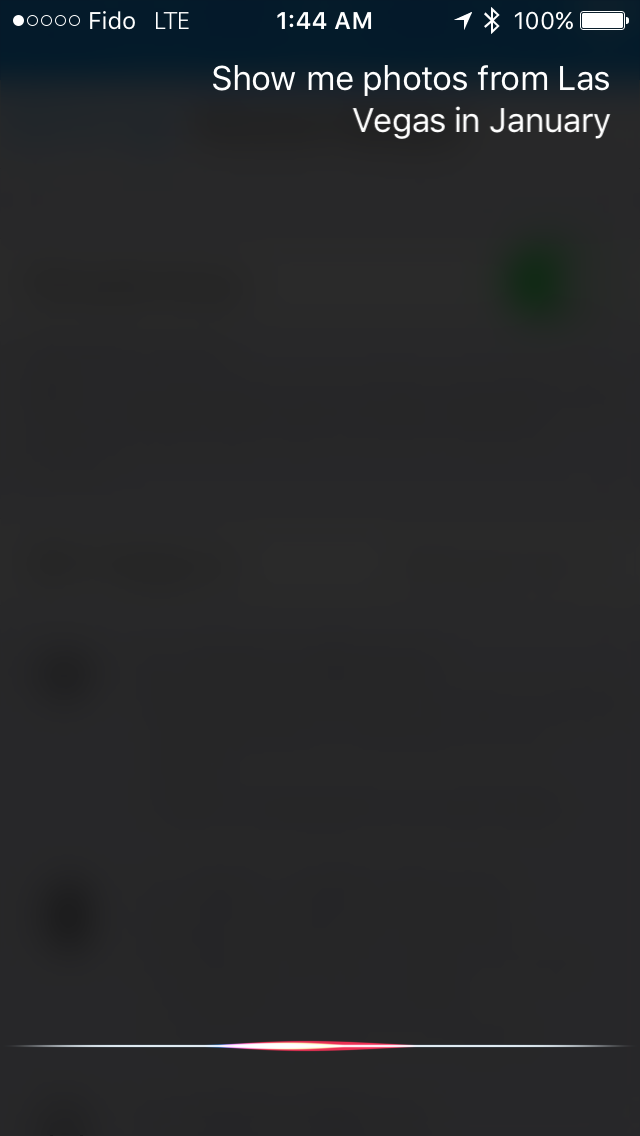
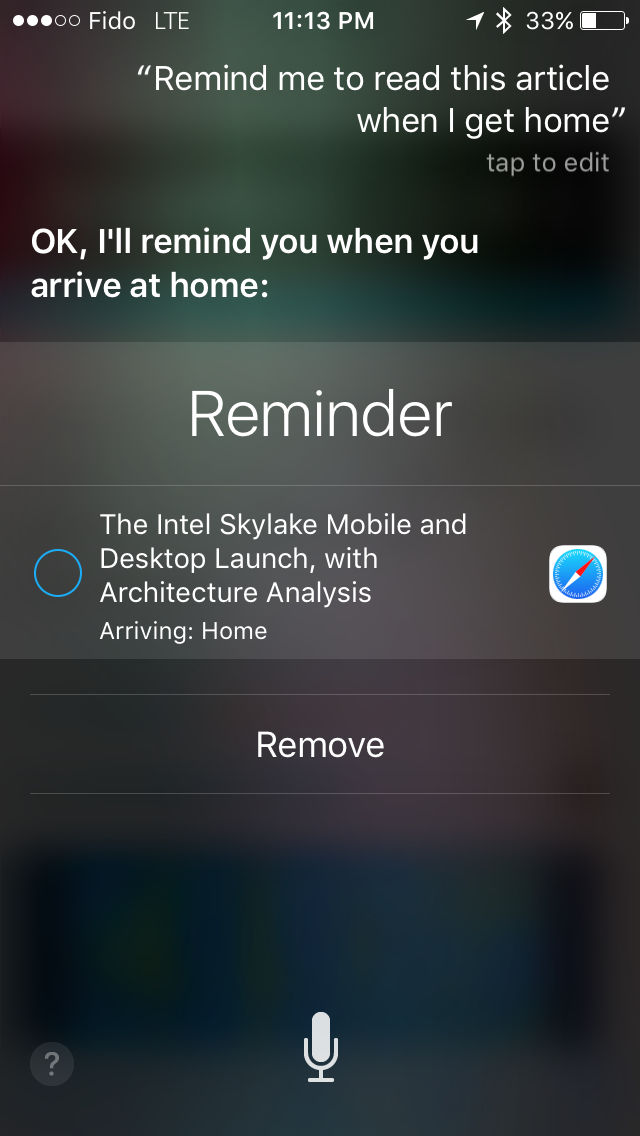
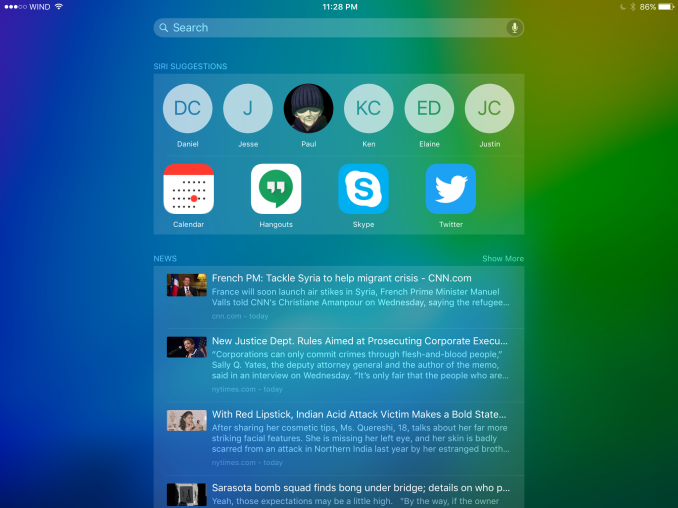
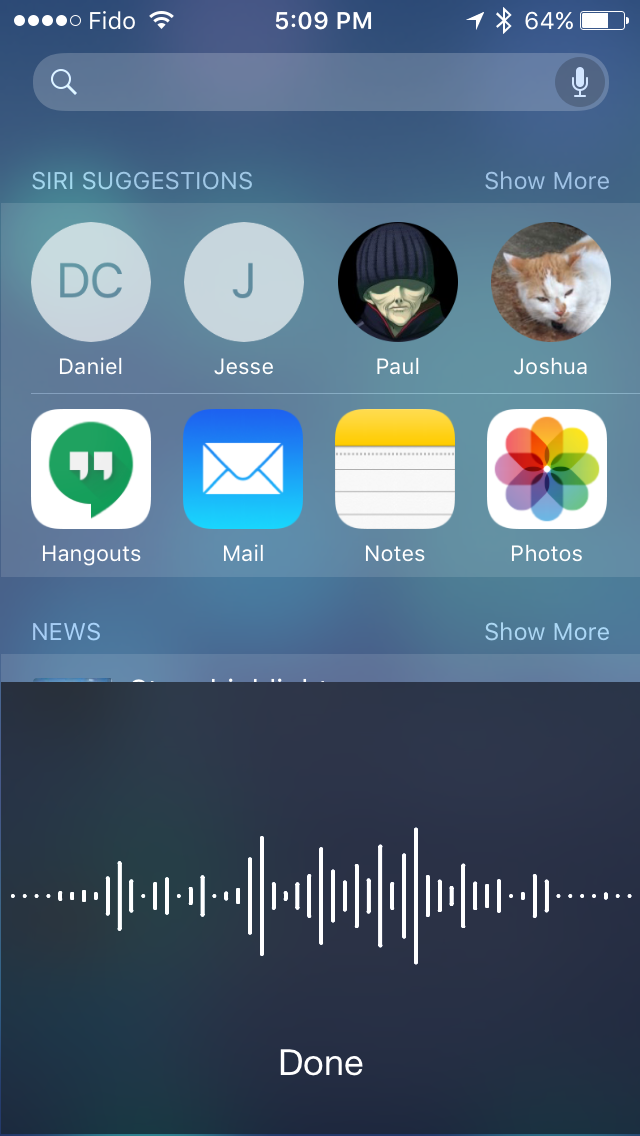
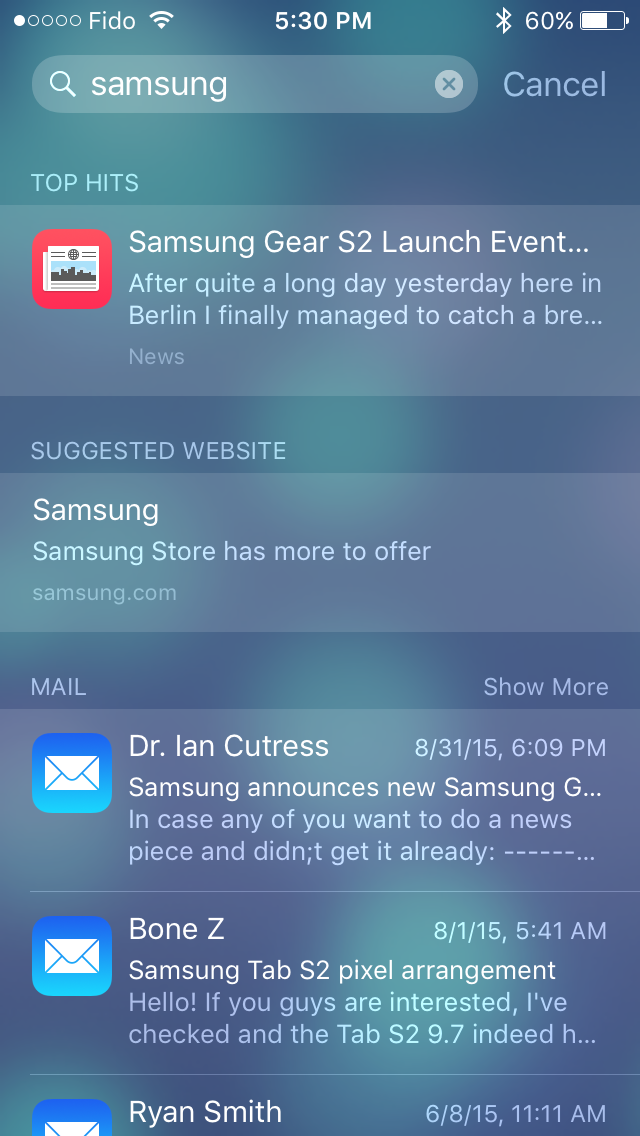
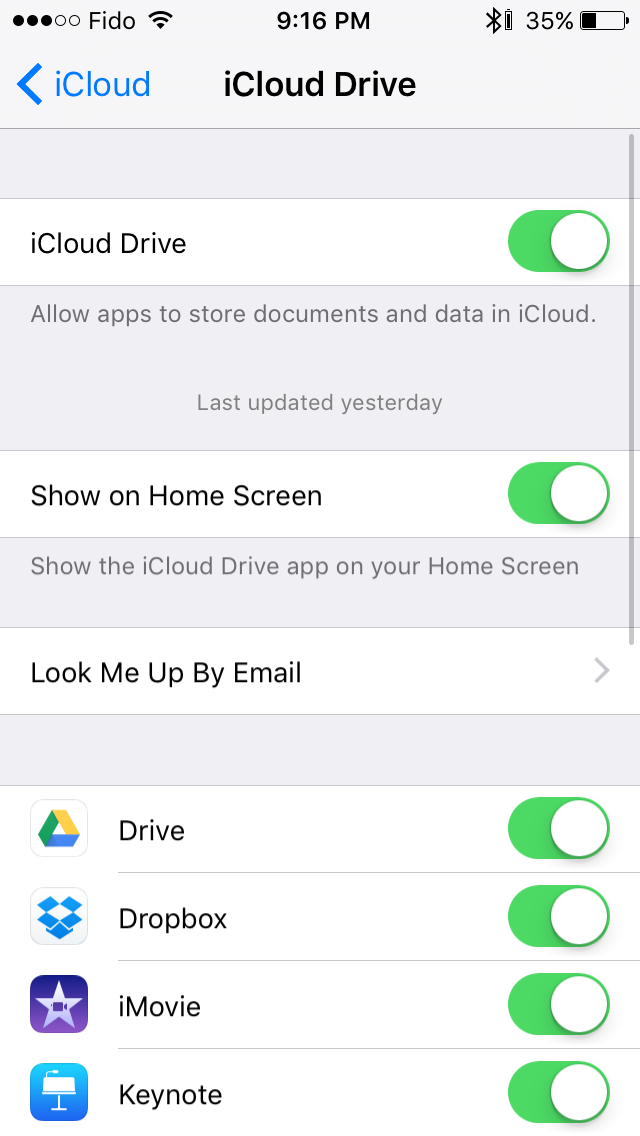
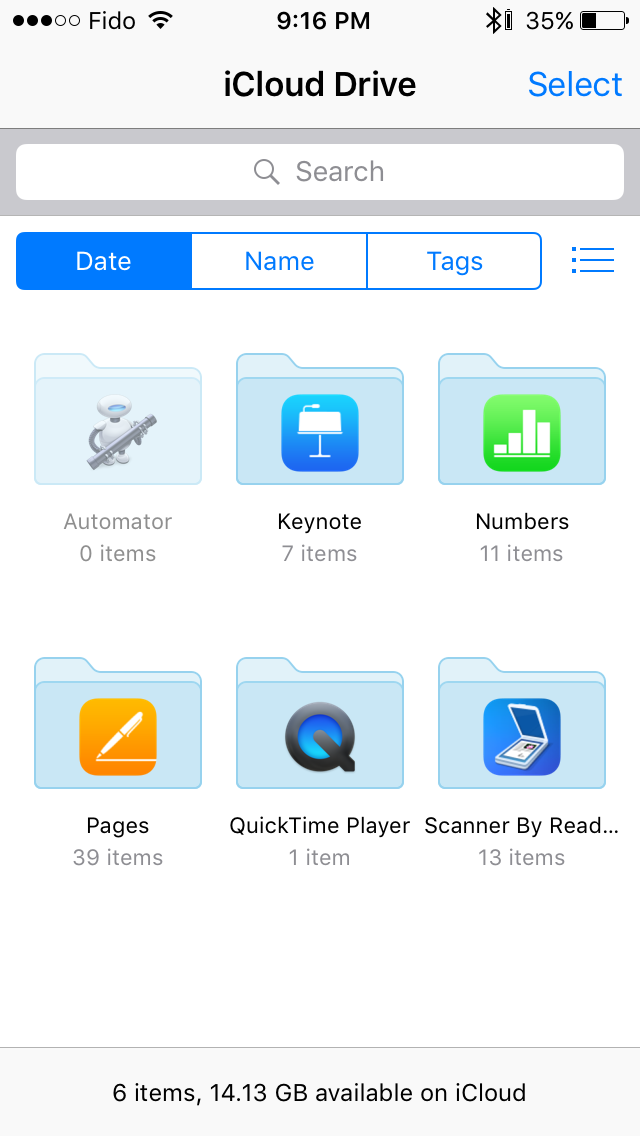








227 Comments
View All Comments
damianrobertjones - Thursday, September 17, 2015 - link
I was under the impression that Apple doesn't make chips.krutou - Thursday, September 17, 2015 - link
iOS is optimized for ARM architecture, and OS X isn't touch optimized. Rewriting iOS for x86 or integrating touch into OS X is a multi-year challenge.FunBunny2 - Sunday, September 20, 2015 - link
-- Rewriting iOS for x86 or integrating touch into OS X is a multi-year challenge.IOS and OSx are both BSD where it matters, and it's optimized for a good C compiler.
Sc0rp - Wednesday, September 30, 2015 - link
It's not that simple.dargonesti - Monday, March 7, 2016 - link
Loll, Apple? Innovation??"It's revolutionnary! It's 0.1 mm thinner and weights 5 grams lesss!" xD
Apple's only good at selling shiny things that costs a lot
Chaser - Wednesday, September 16, 2015 - link
Surface- "is a huge threat to iPad, because of it's versatility." Maybe in your open, technical view of things but most Apple users would never dream of changing ecosystems. They lose significant functionality doing so as they are comfortable with Apple and its applications such as Safari, iMessage, iTunes etc. Apple people want something that works for them in the most simplistic way, and that is consistent. Going Windows for them is a bottomless pit of turmoil to them. So compare TDP, nodes, whatever, the Apple faithful could care less.Joe_H - Wednesday, September 16, 2015 - link
"Maybe in your open, technical view of things but most Apple users would never dream of changing ecosystems. They lose significant functionality doing so as they are comfortable with Apple and its applications such as Safari, iMessage, iTunes etc."More BS from the clueless Apple faithful. Please explain to me how anyone would lose functionality going from a toy like the iPad to a full PC like the Surface? The Surface hardware not only has far greater functionality than the iPad, and Windows has far more functionality than iOS.
"Apple people want something that works for them in the most simplistic way, and that is consistent. Going Windows for them is a bottomless pit of turmoil to them. "
The Apple people are stupid sheep who can't think for themselves, and I hate to break it to you, but Apple consumers are a very small market compared to the overall PC and tablet market. Even in phones they are a small minority. So who gives a damn what they thing.
As for Windows being a bottomless pit of turmoil, spoken like an Apple shill who is so far up Apple's backside, he can't even see daylight. Windows 10 works simply and beautifully on a Surface Pro 3, and there is no turmoil to be found anywhere. So your argument is garbage.
solipsism - Wednesday, September 16, 2015 - link
Do you honestly expect anyone to take your comments seriously when you write stuff like "… a toy like the iPad to a full PC like the Surface"? You then include terms like "Apple faithful," "Apple shill," "so far up APple's backside," but call an actual, reasonable argument regarding pros and cons of utility as garbage. IF you had a point somewhere you completely lost it with excessive anti-Apple position that never even attempted to make an objective comment.Wolfpup - Wednesday, September 16, 2015 - link
There was no "reasoned argument", it was just a claim that somehow switching from iOS to Windows would "lose functionality". That's ludicrous. This so-called "reasoned argument" you mentioned even claimed people would rather use iOS Safari than be on Windows where you can run REAL Firefox, IE, Edge, Chrome... I don't care how faithful you may be to Apple, PLEASE tell me you'd rather use a full real web browser of your choice than mobile Safari! :-OHammerStrike - Wednesday, September 16, 2015 - link
The issue for me is that the notable feature on the Surface is the form factor, but the benefit of the form factor is ease of use, media consumption and mobility, and in all those area's the iPad is a superior device - it's lighter, has a much longer batter life and has hundreds of thousands of apps that are natively designed for a touch interface. The Surface is obviously the superior productivity device, but I just don't see anyone really cranking out spreadsheets, photoshop, etc on it in a mobile, touch form factor. At a minimum you probably want to be at a desk, if not docked into a full desktop environment - if that's the case there's no benefit to the form factor.For me, my iPad is my preferred device to check email, browse the web, read, play games, stream movies/music, etc. From the time I have spent with the Surface I can say that while I can do some of those things on it, it's not a preferred format to do it - works in a pinch, but would prefer other form factors. The navigation and usage of native iOS apps is superior to Win8/10 conterparts (when there are even direct comparables), plus its just a lot more comfortable device to hold for several hours.